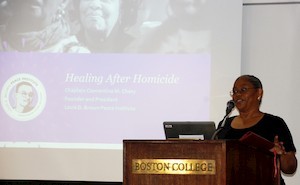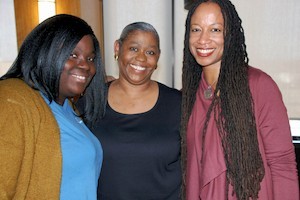
Chaplain Clementina M. Chéry addressed the BC Social Work community on February 24, 2017.
On Friday, February 24th, Chaplain Clementina Chéry, president and CEO of the Louis D. Brown Peace Institute, addressed the Boston College Social Work Community as the School’s 2017 Black History Month keynote speaker. It was a fitting year for Chéry to address BCSSW; this year’s diversity committee theme is Powerful Women.
Chéry founded the eponymous institute in honor of her son who was murdered at the age of 15, when he was on his way to a Christmas party for a group he was a part of back in 1993 called Teens Against Gang Violence. Louis was “a champion of peace whose legacy lives on.” She told the heartbreaking story of her oldest son, caught in the crossfire on a cold December night 23 years ago, to those gathered at Boston College:
“I often tell people that when Louis was killed, that was when I woke up. When we went to the hospital and the doctors told me Louis was brain dead, my whole world, as I knew it, caved in. There were no resources or coordinated services at that time for families of murdered victims.
“We wanted to pray, we were told that the chapel was closed and that there were no chaplains onsite because of budget cuts. My family and I left the hospital empty-handed, physically, and within our soul.
“Now the media debated whether Louis was in a gang. Was it a drug deal gone bad? But after they realized that he was someone’s child, that he came from a two-parent home, the narrative changed. The statements [then became], we’re sorry for your loss. Unfortunately he was in the wrong place at the wrong time.”

Chaplain Clementina M. Chéry with BCSSW students
Chéry went on to explain that, once it was determined that Louis was an “innocent” victim, and not part of gang, the resources began to pour in, and the family was able to receive the support they needed. But this reality made Chéry wonder. What if Louis had been in a gang, or if it had been a drug deal gone bad? Would his family have received the support they needed in their most difficult time of grief and hopelessness? A budding relationship with the mother of the boy who killed Louis would only further ask Chéry to contemplate this question. “We were both impacted,” she explained. “Mother to mother. Woman to woman. Heart to heart.”
The Louis D. Brown Peace Institute was founded a year following Louis’ death, in 1994, to address the injustices of a system that doesn’t support families with children who are victims of violence. Its stated mission is to provide a center for “healing, teaching, and learning for families and communities impacted by murder, trauma, grief, and loss.”
Since its inception, the Institute has developed a peace studies curriculum for Boston area students; founded a program called Survivors Outreach Services (SOS) that is designed to deliver consistent, coordinated services to survivors; published various resource guides for families. These are just a few of the many projects taken on by the Institute. We encourage you to read more about the Institute’s many successes on its website.
Chéry ended her talk with a call to action, encouraging BC Social Work students to come visit the Institute, consider becoming interns, to “experience our center of healing, teaching and learning in the urban settings.”

